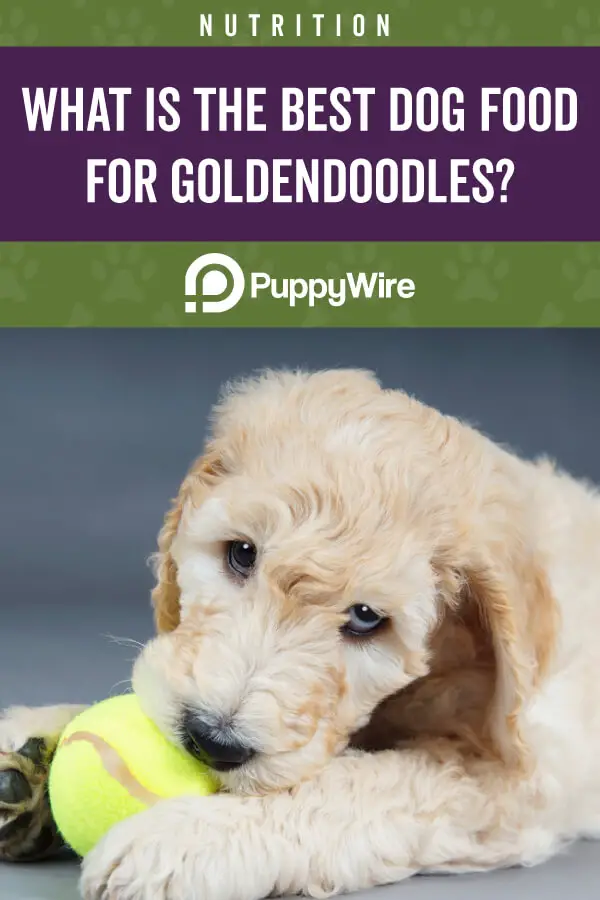Best Dog Food for Goldendoodles 2022 Buyer's Guide and Reviews
 By Ashley Turner Last Updated January 25, 2022
By Ashley Turner Last Updated January 25, 2022
We independently research and recommend the best products; Learn more here. We may receive commissions on purchases made from our product recommendations.
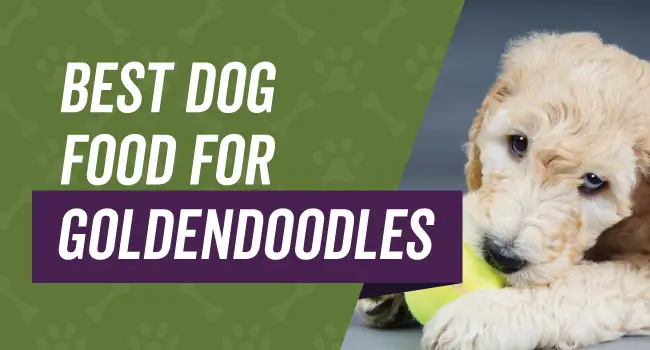
Contents
Our guide will lay out important considerations that you want to keep in mind when you're shopping for the best dog food for Goldendoodles, and this can help ensure that you pick out a food that is going to meet your dog's nutritional requirements. We've also rounded up the top six types of dog food for this breed so you can compare them side by side.
Quick Look at Our Top Picks
---------------------------------------------------
Best for Adults: Hill's Science Diet Large Breed Dry Dog Food at Chewy
"This adult dog food has several flavors, sizes, and styles to choose from so you can customize it to fit your dog."
Best for Seniors: Blue Buffalo Life Protection Formula at Chewy
"This senior food contains real meat as the first ingredient combined with L-Carnitine to support your dog's muscles and joints."
Best for Puppies: Iams Proactive Health Puppy Dry Dog Food at Chewy
"This food is designed to help your puppy build healthy muscles, bones, joints, immune system, and cognitive function as they grow."
Best Grain Free: Rachael Ray Nutrish Zero Grain at Chewy
"This dog food is gluten free and free of filler ingredients, colors, preservatives, flavors, or by-product meals."
Best for Miniature Goldendoodles: Wellness Core Grain Free Small Breed at Chewy
"This food contains an optimal blend of fat and protein to help support your dog's higher energy levels along with their joints and hips."
Best Canned Wet Food: Blue Buffalo Homestyle Dinner Wet Food at Chewy
"This food contains real beef as the first ingredient along with carrots, peas, and sweet potatoes to help support your Goldendoodle's active lifestyle."
Best for Sensitive Stomach & Allergies: Purina Pro Plan Focus Sensitive Skin & Stomach at Chewy
"This food is easy on your dog's stomach and has no soy, wheat, or corn as well as no by-products, artificial flavoring, or artificial colors."
What to Look for in the Best Foods for Your Goldendoodle

Since the Goldendoodle is a designer dog with two different breeds, it's important that you pay close attention to the ingredients in their food. Doing so will ensure that your dog gets all of the nutrients they need to support healthy growth, lean muscles, a strong immune system, brain and eye development, nourished skin, and a shiny coat. The most important ingredients are below.
Protein
These are high-energy dogs that need a lot of protein in their diets to give them energy, and you should see a protein source listed as one of the first ingredients on the dog food label. A lot of grain-free dog foods incorporate plant protein with meat protein, and food with grains usually uses animal sources for their protein content.
Chicken, duck, turkey, bison, venison, beef, fish like salmon or whitefish, and eggs are all very common protein sources in dog food, and you should see a whole protein source like whole chicken or whole duck. Be careful if you choose to feed your dog a grain-free food because they usually have a lot of lentils and peas to boost the protein content, but it's not as beneficial as meat-based protein for your dog.
Healthy Fats
Although your first instinct could be to avoid fats in dog food, your dog's body coverts the healthy fats they eat into an energy source that helps them plan and stay active. It's especially important when your dog is a puppy because they play a lot and do a lot of running around, so the food should have a higher healthy fat content.
There are two main ways dog foods label fats on their food, and you'll see it listed as a specific animal fat like chicken fat or as a generic animal fat. Ideally, your food would have several individual fats listed, and you should avoid ones that have the more generic label because you have no idea what you're feeding your dog.
Examples of Healthy Fats
- Beef Fat
- Chicken Fat
- Lamb Fat
- Pork Fat
- Canola Oil
- Safflower Oil
- Salmon Oil
- Sunflower Oil
- Whitefish Oil
Examples of Unhealthy Fats
- Animal Fat
- Beef Tallow
- Lard
- Mineral Oil
- Poultry Fat
- Vegetable Oil
Fatty Acids
Also called Omega fatty acids, these ingredients are extremely important to help your dog's joints, increase their flexibility, nourish their skin, and give them a healthy, shiny coat. The good news is, fatty acids come from both plant and animal sources, and you can get both in your dog food's formula to help keep them healthy.
The first thing that may come to mind when you think of fatty acids is fish like salmon or sardines, and fish is a generally good source. However, there are other great sources of fatty acids like any chicken or beef fat, canola or sunflower oil, and soybean oils. Just like the other ingredients, they should be relatively high on the ingredient list.
Carbohydrates
If you perform a quick search for carbohydrates in dog food, you'll see a lot of debate because some people believe that dogs don't need them while others claim they can have them in small portions. Dogs can digest carbs, but they should only make up a small part of the dog food formula because they're not essential.
Carbohydrates can help your dog feel full between meals so they won't be hungry again in an hour and start begging for food. Dietary fiber is a carbohydrate, but it should come from healthy sources like potatoes, barley, oats, sweet potatoes, chicory, and beet pulp because they're easier for your dog to digest and break down.
Any dog food that has over 40% carbohydrates in the formula isn't good for your dog because this means that the manufacturer most likely packed it with empty fillers to bulk up the formula. This allows them to lower the amount of beneficial ingredients like protein to save money. Canned or wet food has the lowest number of carbohydrates of any dog food.
Fiber
The next thing you want to see in your dog's food is fiber because fiber is essential for helping regulate your dog's digestive system while keeping them from getting constipated. Fiber is unique as it only comes from plant-based ingredients, and many people make the mistake of overlooking how important it is when they consider the nutritional value of a dog food.
Healthy ingredients like peas, potatoes, and green beans all have a higher fiber content, but you want to avoid bad ingredients that could also add fiber like corn, soy, or wheat because they're allergy triggers. A lot of dog foods come with 1% to 10% fiber listed on the guaranteed analysis, and you should aim for 2% to 4% to be safe. Too much can create hard stools and too little can lead to diarrhea.
Antioxidants, Vitamins, and Minerals
Finally, it's important that you pay close attention to the vitamin, mineral, and antioxidant content in your dog's food because these are essential to your dog's continued health. Vitamins and minerals promote steady growth, brain development, eye health, joint health, a strong immune system, shiny coat, nourished skin, and much more. In a balanced food, you should see the vitamins and minerals listed below.
- Vitamins A, E, D, and K
- B-Complex Vitamins like B12
- Calcium
- Phosphorous
- Choline
Dog foods aimed at puppies have DHA to help support healthy brain development, and foods aimed at senior dogs have glucosamine and chondroitin to support healthy and flexible joints.
Antioxidants are another thing you want to see in your dog's food, and common sources include things like blueberries, apples, cherries, beets, carrots, asparagus, peas, kale, cranberries, and broccoli. Antioxidants are key to helping heal and prevent free radical damage to your dog's cells, and they also give your dog's immune system a helpful boost.
Ingredients to Avoid in Your Dog's Diet
Unfortunately, there are things you don't want to feed your Goldendoodle, and you should always double-check the label to see whether or not your potential food contains them. If it contains a lot of these ingredients, you may want to look elsewhere for a healthy alternative.
Rendered Fats
Rendered fats are something we mentioned earlier when we talked about avoiding broad category labels like animal fats in your dog's food. These are flavor enhancers for your dog, but they're also a breeding ground for toxins like heavy metals and bacteria like Salmonella. If moisture gets into the bag, mold and bacteria can thrive and potentially make your dog sick.
Preservatives and Chemicals
BHT, BHA, and Ethoxyquin are three very popular preservatives in many types of dog food, and they usually get added to the oils in dog food and treats to make them all last longer while improving their shelf stability. BHT can cause liver and kidney damage in rats, and BHA is one of the things on California's Proposition 65 list as a known cancer-causing agent.
Ethoxyquin is banned in the United States for use in human food, but manufacturers can still legally add it to dog food. You'll find it on the label under fish meal to help extend the life of the food, and and it can be harmful if you were to accidentally get it directly on your skin or swallow it. Vitamin E and C are a safe alternative to this chemical.
Propylene Glycol is another popular agent in wet dog food and treats that adds moisture to it, and it gets chemically derived from antifreeze. As a general rule, antifreeze is very toxic to pets, and the pet food industry claims that it's safe for your dog to have this chemical. However, it's better safe than sorry.
Artificial Dyes or Colors
Artificial dyes and colors make the dog food easier to sell because it looks more aesthetically pleasing to pet parents, but you don't want to see Red 40, Blue 2, or Yellow 5 and 6 in your dog's food because they can bring about a type of allergic reaction in your dog when they eat. These dyes have also caused cancer and behavioral problems in humans.
A caramel coloring can contain levels of 4-methylimidazole which is a known carcinogen to animals, and the FDA acknowledges the Red Dye 3 is a known carcinogen. Look for natural dog foods that don't contain unhealthy artificial dyes. After all, your dog doesn't care what their food looks like.
Filler
All dog food will have some form of filler in it to help bulk up the formula and help your dog feel full, but not all fillers are a good thing. Since these ingredients usually don't add a lot of nutritional value to your dog's diet, you want lower numbers of filler and higher numbers of healthy ingredients. We listed the fillers you want to avoid if at all possible below.
- Fish, Meat, and Poultry By-Products - There is debate about by-products, but they are the leftover animal's internal organs at fish farms or slaughterhouses, and they can contain diseased tissue. They're usually heated to very high temperatures, dried, and added to the food.
- Corn, Wheat, or Soy - Low-quality dog foods come packed with corn, wheat, or soy because these are very cheap ingredients that can help make the ingredient list look fuller. However, many dogs are allergic to one of these ingredients, and you want to avoid them.
- Any Type of Hull - If you see things like oat hulls, soybean hulls, or rice hulls, these offer no nutritional value to your pet. They can add a small amount of fiber to your dog's diet.
Tips to Transition Your Dog to a New Dog Food
Any time you switch your dog to a new food, you have to slowly transition them over to it over the course of a week or so. If you don't, your dog can end up with an upset stomach, vomiting, diarrhea, and more. If you notice your dog is having difficulty with their new food, you can stretch the transition out over two weeks instead of one, but we'll outline how to do it in one week below.
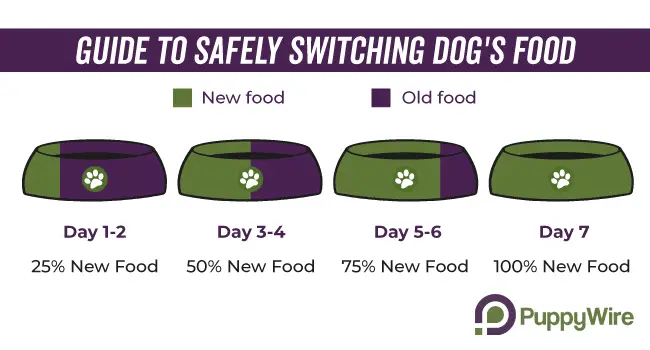
- Days One and Two - On days one and two, you should feed your dog 75% of their normal food to 25% of the new food for each meal. Carefully portion this out and mix it in.
- Days Three and Four - You're ready to give your dog half-in-half at each meal. Mix 50% of the new food with 50% of their current food and monitor them to make sure they tolerate it.
- Days Five and Six - By this time, you want to feed your dog 75% of the new food with 25% of their old food for the next two days. This formula should be for every meal.
- Day Seven - On the final day, you've given your dog a full week to transition to their new food. You can now feed your dog 100% of their new food without any of their old food.
Goldendoodle Feeding Guide
How often should you feed your Goldendoodle to help them maintain a healthy weight? This can be a challenging question to answer because it changes as your dog ages, and their activity levels also play a role in the amount of calories they need.
Puppy Goldendoodle Feeding Guidelines
For the first year, your puppy will go through a rapid growth spurt that means they need a lot of calories to keep up their energy levels and healthy development. If your puppy is between four months to a year and weighs around 30 pounds, you'll give them between 900 and 1,000 calories. Puppy foods naturally have higher calorie levels for this very reason.
As a general rule, you'll look at the side of the bag for feeding recommendations and guidelines and adjust them accordingly for your dog. Feed your puppy three or four meals a day until they're a year old, and switch to feeding your puppy two meals a day at the same time each day after they pass the year mark.
Adult Goldendoodle Feeding Guidelines
Most adult Goldendoodles weigh between 45 to 50 pounds when they reach adulthood, and they'll need between 1,200 and 1,300 calories to keep their energy levels up and at a healthy weight. The exact calorie count will depend on your dog's metabolism, activity level, and age, and no two Goldendoodles are the same.
If you spay or neuter your dog, they'll require fewer calories each day because this can slow down their metabolism, and it's a big reason why a lot of dogs gain weight after this surgery. You can read the label or ask your vet if you're not sure if you should feed your dog more or not, and you should split their food between two meals.
Senior Goldendoodle Feeding Guidelines
Once your dog hits seven years old, they're entering senior territory and you'll find yourself adjusting their food intake because they start to slow down. This is especially true for bigger dogs like Goldendoodles, and a senior will need between 700 to 1,000 calories per day, split between two meals.
You should be able to feel your dog's ribs when you touch them, but you shouldn't be able to see them. If you notice their ribs showing, increase the calories. If you can't feel the ribs, cut back because having an overweight dog can predispose them to several different health problems.
Miniature Goldendoodle Feeding Guidelines
Miniature Goldendoodles weigh between 15 and 35 pounds, and this smaller stature changes their calorie needs, but you should still follow the puppy, adult, and senior feeding schedule. Puppies eat three or four times a day, adults and seniors eat twice, and you should pick up their food between meals so you don't encourage free feeding.
A Miniature Goldendoodle puppy weighing 15 pounds will need roughly 550 calories a day, split into three or four meals. An adult weighing 25 pounds will need 820 calories a day, and an inactive senior will need between 500 and 600 calories a day. This helpful calculator will help you narrow down exactly how much to feed your dog based on their weight, the food, and the activity levels.
Common Health Issues Your Goldendoodle Can Face
Although this is a moderately healthy designer dog, they are slightly larger and prone to some health issues. Keeping them at a healthy weight can help stave off some of these health issues, but it's important that you keep an eye out for them so you can treat them.
Hip Dysplasia/Luxating Patella
Hip dysplasia is a medical condition that impacts your dog's ball and socket joint on their hip, and it can happen as a result of an injury or be a hereditary condition. Over time, one or both of your dog's hips can be impacted by this problem, and it can cause discomfort and stiffness.
Luxating patella affects your dog's knee joints instead of their hips, and their kneecap will pop out of the groove it's supposed to sit in. It can happen in one or both knees, and it can lead to pain and limping in older pets while younger dogs don't have any symptoms. Surgery can help fix it.
Progressive Retinal Atrophy
This is another genetic disease that progressively destroys the retina's cells in your dog's eyes, and this causes the dog to go blind. This is a slow disease that can make your dog's eyes appear light gray or white as the light hits them, and there is no treatment for it at this time.
Von Willebrand Disease
Von Willebrand Disease is a condition where your dog's blood doesn't clot properly, and it's genetic. You can't cure this disease, but it is possible to control it with therapy and medications that help replace the clotting protein in the blood.
Ear Infections
Because this breed has floppy ears, it's easy for yeast and moisture to build up and cause chronic ear infections. To help prevent them from occurring, you can make sure to dry your dog's ears after they go in the water and ask your vet for medicated drops you can apply.
Bloat
Bloat is a life-threatening condition where their stomach fills with fluid or gas and flips over on itself. It's common in larger dogs and dogs who eat fast, and it requires surgical intervention to treat because it cuts off the blood flow and can lead to organ failure.
FAQ About Foods for Doodles
Is chicken bad for Goldendoodles?
No. Goldendoodles enjoy meat-heavy foods, and chicken is a lean source. It can be an allergen though, so it's a good idea to monitor your dog if you switch them to a food with chicken as the protein.
Do Goldendoodles eat a lot?
This breed eats as much as your average large breed dog, so it can get expensive if you feed them top-tier food. They eat more because they burn a lot of energy, too.
Which protein source is best for Goldendoodles?
Eggs are a very good protein source for any dog because they're easy for your dog to digest, most dogs aren't allergic, and you can pack a lot of protein into a small serving. Beef, fish, chicken, duck, bison, venison, and lamb are are good choices.
Is freeze-dried food good for Goldendoodles?
As long as the freeze-dried food comes balanced with all of the nutrients, minerals, vitamins, and protein your dog needs to stay healthy, freeze-dried food can be a good option. Double-check the label and make sure your dog is getting everything they need.
Grains vs grain-free food: which should your Goldendoodle eat?
As long as your dog has no allergies, you should feed them food with grains because it has more animal-based proteins. Grain-free food tends to add a lot of plant-based protein, and this isn't as good for your dog as animal-based choices.
Should Goldendoodles eat dry or wet food?
Both options are great for your dog, and it usually comes down to personal preference. Some dogs like wet food and some prefer dry, or you could try mixing both of them to give your dog a little variety. If you're curious about which food to feed your dog, take a look at our review roundup of the best dog food for Goldendoodles below.
Our Top Six Picks for the Best Dog Food for Goldendoodles
Best for Adults: Hill's Science Diet Large Breed Dry
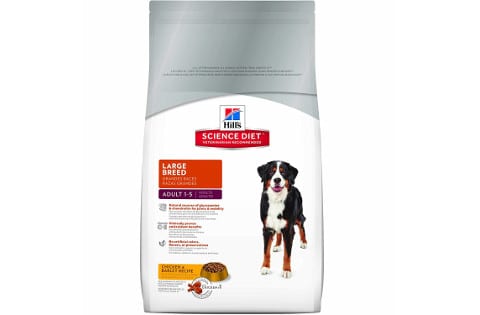
This adult Goldendoodle dog food comes in three different styles ranging from large breed dry to light, four different flavors including chicken, lamb, or chicken and barley, and four different size options.
This multitude of options allows you to quickly and easily tailor your purchase to suit your needs and your dog's tastes.
Your dog will get great sources of Chondroitin and Glucosamine to help support their joints and bones as they get older, and it is also packed with Omega-6 fatty acids, antioxidants, vitamin C, vitamin A, and a variety of nutrients to help support a healthy immune system and a healthy coat.
There is no artificial colors, flavors, or preservatives for a healthier formula, and a lean protein source is the first ingredient listed on the package.
Goldendoodle parents who bought this adult dog food liked that there were several flavors, size, and styles to choose from that they could customize to fit their dog, and they also liked that a lean protein was the first ingredient.
Goldendoodle parents didn't like that it can cause stomach upset and loose stools, or that it left a slightly greasy residue.
|
Things We Liked
|
|
Things We Didn't Like
|
Best for Seniors: Blue Buffalo Life Protection Formula
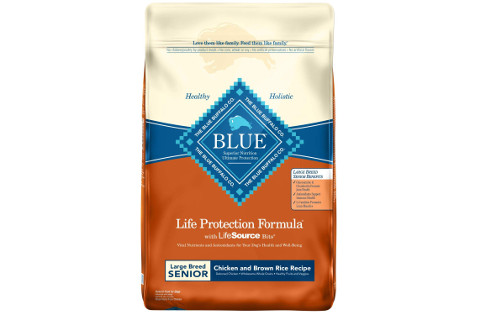
This Goldendoodle dog food is formulated with a senior dog in mind because it contains real meat as the first ingredient combined with L-Carnitine to support your dog's muscles and joints as well as a healthy blend of fruits, vegetables, and whole grains.
Your senior Goldendoodle will also enjoy the benefits of Glucosamine and Chondroitin to help support their joints and allow them to move easier.
This quality food comes with a blend of LifeSource Bits that are packed full of antioxidants, minerals, and vitamins to help reduce oxidative stress on your dog's body, support their immune systems, and fill in any gaps in their nutrition. There is no poultry by-products, artificial flavoring, soy, wheat, or preservatives in this formula either.
Senior dog owners liked that their dog gets LifeSource Bits along with a great blend of Glucosamine, Chondroitin, and L-Carnitine to support joint and muscle health, and they were also pleased that real meat was the first ingredient.
Senior dog owners were not happy that it only comes in one flavor and size, and you really can't customize it.
|
Things We Liked
|
|
Things We Didn't Like
|
Best for Puppies: Iams Proactive Health Puppy
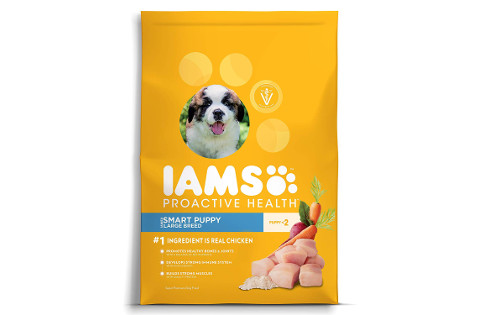
Iams puppy formula gives you the choice of six sizes ranging from a small 3.3 pounds up to a larger 38.5 pounds, and you can also choose from three different styles including medium breed, large breed, and toy or small breed.
Goldendoodle puppies will enjoy real chicken as the first ingredient, and there are also 22 other essential nutrients that are naturally found in mother dog's milk.
This Goldendoodle puppy food is designed to help your puppy build healthy muscles, bones, joints, immune system, and cognitive function because it is formulated with Omega-3 DHA which can support brain growth and memory.
Your puppy will also get beet pulp to improve their digestion, whole grains for energy, and no artificial preservatives, soy, or wheat that could upset their stomachs which is important at this life stage.
Puppy owners were happy that this food came in smaller bag choices so they could try and see if their puppy liked it before committing to a larger bag, and they also liked that there are 22 essential nutrients in this formula to support healthy growth.
Puppy owners didn't like that this food may be too harsh on more sensitive stomachs, and they also noted that it could cause runny stools.
|
Things We Liked
|
|
Things We Didn't Like
|
Best Grain Free: Rachael Ray Nutrish Zero Grain Natural
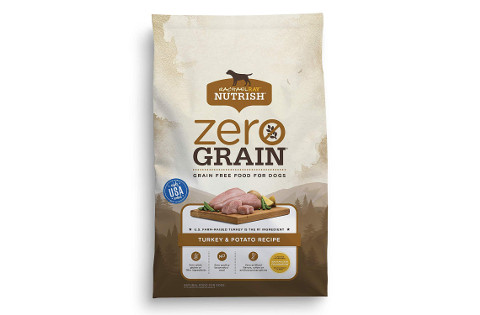
Grain free dog food is an excellent choice for dogs who have sensitive stomachs, and this food comes with real turkey as the first ingredient followed by peas, whole potatoes, and tapioca for alternative carbohydrates, beet pulp to aid in digestion, and whole flaxseed to support healthy skin and coat. It starts with six pound bags and goes up to 28 pound bags.
This grain-free recipe is gluten and free of filler ingredients, colors, preservatives, flavors, or by-product meals, so it's healthier for your dog.
Your Goldendoodle will get vitamins and minerals to help support their systems inside and out (which is important to your dog's diet), and the kibble is designed to be smaller and easier for your dog to digest.
Dog parents who bought this grain free dog food were happy that it contains alternative carbohydrates, whole flaxseed, and beet pulp to aid digestion, and they also liked that it was packed with vitamins and minerals.
Dog parents weren't happy with the price of this food, and they didn't like that the kibble pieces were still slightly large.
|
Things We Liked
|
|
Things We Didn't Like
|
Best for Miniature Goldendoodles: Wellness Core Natural Grain Free for Small Breeds
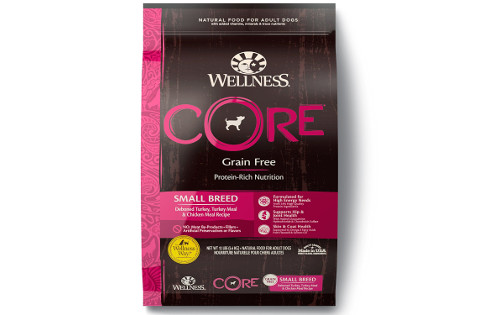
This food contains an optimal blend of fat and protein to help support your dog's higher energy levels along with their joints and hips.
Your Goldendoodle will get a good amount of Omega-3 fatty acids for skin and immune support from the salmon oil and flaxseed oil that is formulated in.
This miniature dog food also comes with probiotics that help to support your dog's digestive health and help to ease the digestion process each time your dog eats.
There is no wheat, soy, eggs, corn, preservatives, artificial colors, flavors, or gluten in this food for a healthier formula.
Miniature Goldendoodle parents who bought this food were happy that it has higher protein and fat to help support their dog's higher energy levels while also helping them to maintain a healthy weight.
Goldendoodle parents were not happy that this miniature breed dog food was on the more expensive side or that it has a slightly stale smell.
|
Things We Liked
|
|
Things We Didn't Like
|
Best Wet Food: Blue Buffalo Homestyle Recipe Canned Dog Food
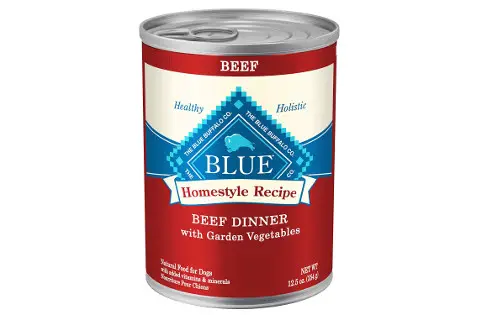
Are you feeding your Goldendoodle wet food or giving it as a special treat once in awhile? If so, then this Blue Buffalo Homestyle Recipe will sure be a hit.
This food contains real beef as the first ingredient along with carrots, peas, and sweet potatoes to help support your Goldendoodle's active lifestyle.
It contains no by-product meals, corn, wheat or soy and not artificial flavors or preservatives.
Goldendoodle owners who bought this food liked that real beef is the first ingredient. They also found this food pleases picky eaters and many other dogs love it too.
Some Goldendoodle owners didn't like the pate texture. Others seemed to have some shipping issues with dented cans arriving. It can also get expensive if your Goldendoodle eats this for every meal.
|
Things We Liked
|
|
Things We Didn't Like
|
Best for Sensitive Stomachs and Allergies: Purina Pro Plan Focus
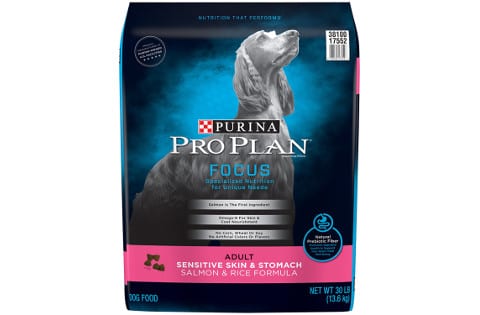
You get lamb and oatmeal or salmon and rice flavors when you order this food for your dog, and it also comes in six size choices with either all breeds or small breed formulas.
Your Goldendoodle will get a good amount of prebiotic fiber that helps to help support their digestive tract each time they eat this food.
Purina Pro Plan also contains a formula that is easy on your dog's stomach including no soy, wheat, or corn as well as no by-products, artificial flavoring, or artificial colors.
The first ingredient is a real meat protein, and they pair this with easily digestible carbohydrates like brown rice and fish oil for a healthy coat and skin.
Dog parents who bought Purina Pro Plan Focus liked that they could choose from two different flavor profiles and each had prebiotics to support a healthy digestive system, and they were happy that the carbohydrates were designed to be easily digestible.
Dog parents weren't happy that this dry dog food had a very crumbly texture.
|
Things We Liked
|
|
Things We Didn't Like
|
Our Pick for the Best Dog Food for Goldendoodles
Our pick for the best food for Goldendoodles is Hill's Science Diet Large Breed Dry Dog Food because it comes in several different styles, sizes, and flavor profiles that allows you to tailor it to suit your dog's needs. It also comes formulated with Chondroitin, Glucosamine, Omega-6 fatty acids, vitamin C, vitamin A, and essential nutrients.
We also chose this food because it contains a natural formula that is healthier for your Goldendoodle including no preservatives, artificial colors, or artificial flavors. All of these things combined helped us choose this food as one of the best available on the market for your Goldendoodle.
